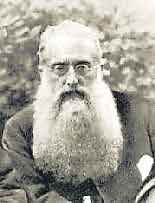| More Events
In May
"The American who inspired the Buddhists"
On May 17, 1880, a great American who was to become
a source of inspiration and guidance to the Buddhists of Sri Lanka
arrived in Galle. He was Colonel Henry Steele Olcott (1832-1907),
the American theosophist who had come to India the previous year.
He had been impressed with the reports he read in the American press
about the Panadura Debate (1873) when Venerable Migettuwatte Gunananda
Thera proved himself a debater of a very high order and triumphed
in a keenly contested debate with the Christians. Olcott arrived
with Madame Helena Blavatsky, Russian born American who had a keen
interest in oriental philosophy and the occult. Both of them had
founded the Theosophical Society in New York in 1875 having been
influenced by Buddhist and Hindu teachings.
Olcott and Blavatsky were warmly welcomed by the public. They had
heard of them through Gunananda Thera who had translated pamphlets
sent to him by Olcott. Both of them observed pan sil and became
Buddhists on May 25, 1880 at the Vijayananda Pirivena, Galle. On
the same day the Galle Buddhist Theosophical Society was formed.
Colonel Olcott came to Colombo and gave the lead to the Buddhist
revivalist movement, particularly helping in establishing Buddhist
schools at a time when missionary schools were being set up everywhere.
For this purpose he founded the Buddhist Theosophical Society (BTS)
in Colombo.
Starting with the establishment of the Pettah Buddhist Boys' School
(1886) in a house at Maliban Street which later became Ananda College,
Buddhist schools were set up at leading towns like Galle (Mahinda
College) and Kandy (Dharmarajah College). Until the take-over of
schools by the Government in the 1960-61, the BTS managed a large
number of Buddhist schools throughout the country which were administered
as schools assisted by the Government.
Colonel Olcott toured the country in a double bullock cart inspiring
the Buddhists to fight for their lost rights. He formed the Buddhist
Defence Committee and successfully agitated to win back the public
holiday for Vesak. He shuttled between India and Sri Lanka and by
the time he finally left Sri Lanka in 1906, the situation of Buddhists
had improved considerably. He died in Adyar, Madras on February
17, 1907.
National leaders like Anagarika Dharmapala were greatly influenced
by Colonel Olcott. The Anagarika recorded his first impressions
thus: "When they (Olcott and Madame Blavatsky) arrived in Colombo
in June (1880), I walked all the way from school to the place where
the first lecture was to be delivered by Colonel Olcott. When all
had left my uncle and father remained behind, and I was with them.
My uncle had already become a favourite with Mme Blavatsky and I
still remember the delight I felt when I along with them shook their
hands when they said goodbye to them. I was drawn to Madame Blavatsky
intuitionally never expecting that four years later, she would forcibly
take me with her to Adyar in spite of the protests of my father,
grandfather, the High priest Sumangala and of Col. Olcott.
Ever since June 1880 I felt myself drawn towards the Founders and
I would never miss reading the Theosophist (magazine published by
the Theosophical Society in New York) when it arrived at the address
of the Agent, Mr J. R. de Silva." |
